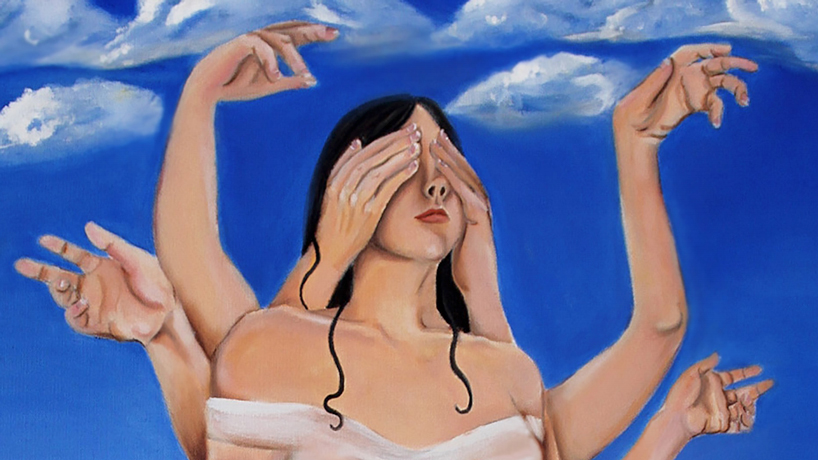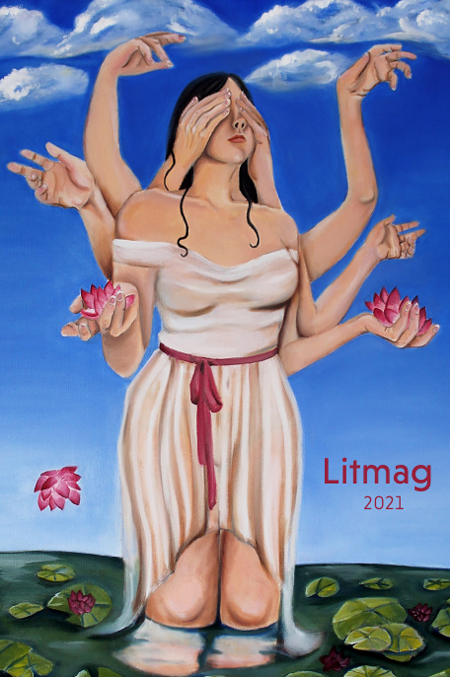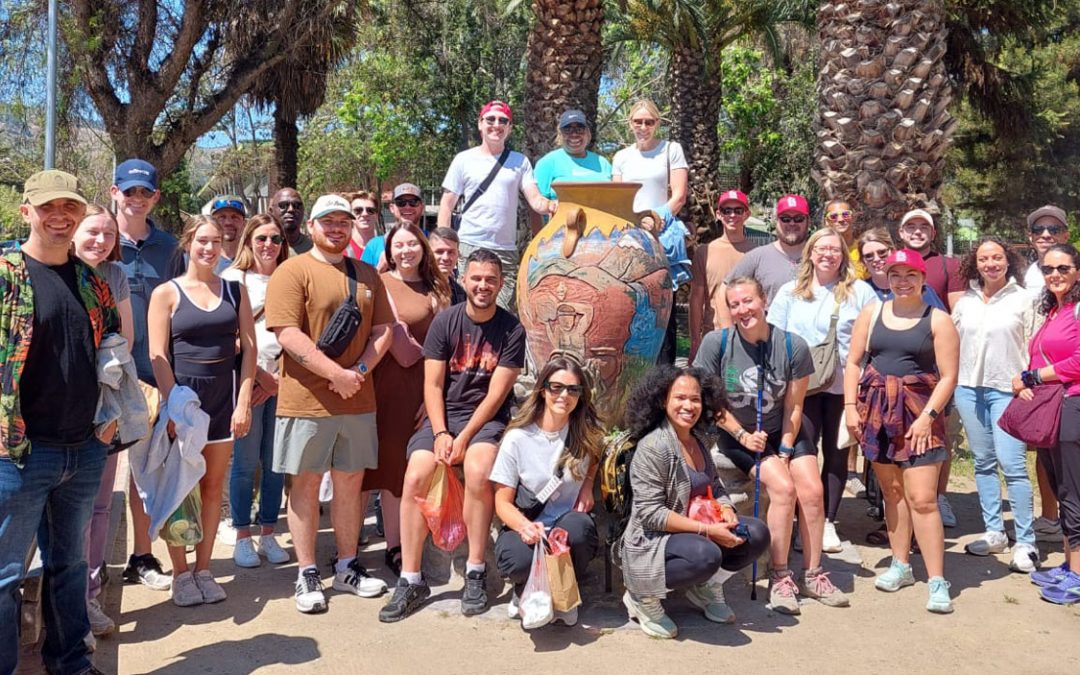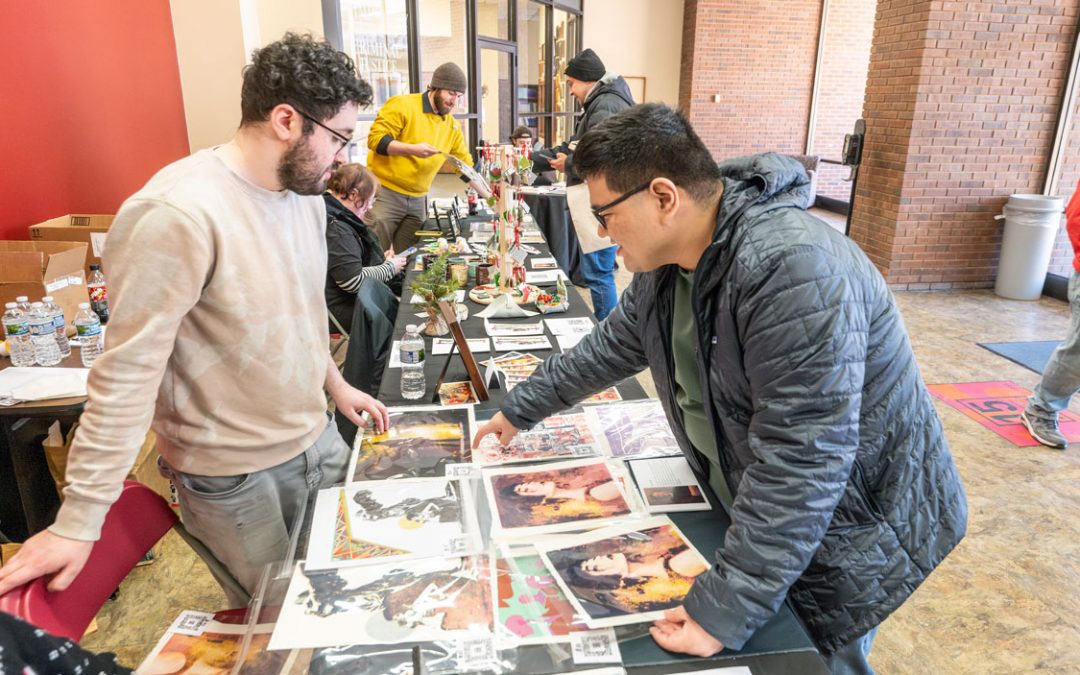
The 33rd installment of Litmag highlighted experiences that connect the UMSL community and moments of hope during a difficult year. Despite the challenges of the COVID-19 pandemic, Litmag, Bellerive, Brain Stew and Provenance were still able to deliver a deluge of creative work to their readers. (Litmag cover artwork by Luna Noelle)
There is beauty in small pleasures – a fall candle or a walk in the woods. Yet, the complexities of life – fragile relationships and mortality – also bring a measure of appreciation for the present.
That’s the message that weaves it way through the 33rd installment of Litmag, the annual student-run University of Missouri–St. Louis literary and art journal, which is comprised of works from campus creators.
After a school year filled with the uncertainty and stress of the COVID-19 pandemic, the Litmag staff wanted to shine a light on the experiences that connect the UMSL community and moments of gratefulness and hope.
It was a tough line to walk, but Kate Watt, Litmag faculty advisor and assistant teaching professor of English, felt the staff succeeded in its vision.
“What a lot of us have realized over the last year is how important those simple joys, those mundane daily activities that we may have taken for granted in the pre-COVID times, how important those became,” she said.
Despite the difficult year, Litmag and other campus publications such as Bellerive, Brain Stew and Provenance, were still able to deliver a deluge of creative work to their readers.
Litmag received nearly 250 submissions between October and March, and 52 pieces of artwork, poetry and prose made it into the final print edition. At the start of the submission period, Watt wasn’t sure what the response would be.
Typically, Watt and her students spread the word through fliers on campus and digital TV displays at the Millennium Student Center, but that wasn’t an option this past school year. Instead, professors in the Department of Art & Design, English Department and Language and Cultural Studies Department let students pop into their classes to solicit submissions via Zoom.
The culling process was as difficult as ever, though.
“We just had such eclectic tastes and, at times, opposite tastes,” Litmag Editor-in-Chief Tara Clarkson said. “Choosing which pieces were going to be in there took a lot of doing. It came to a certain point, we actually didn’t have enough. We were like, ‘We’re being too hard on everything.’ We had to go back and be a little bit more forgiving. We really wanted this to be a substantial issue.”
Clarkson and Watt said the issue showcased a wide variety of styles and voices. It also featured more visual art – paintings, photographs and sketches – than previous issues. Coincidentally, much of the artwork complemented pieces of poetry and prose.

Luna Noelle’s painting, “Arms Dealer,” was selected by the Litmag staff to adorn the cover. Noelle drew inspiration from surrealism and horror films. (Litmag cover artwork by Luna Noelle)
“There was some art that immediately went together with some of the writing,” Clarkson said. “I helped order the pieces, and there was a group of them where I was like, ‘These are staying together.’ They just seemed to work really nicely.”
The staff was immediately struck by Luna Noelle’s painting, “Arms Dealer,” which depicts a multi-armed woman with her eyes covered by two hands while two more hands cradle lotus flowers. Noelle drew inspiration from surrealism and horror films, creating imagery that Watt felt was at once frightening, inviting and mysterious.
Eventually, it won a spot on the cover, marking the second year in a row Noelle’s work has adorned the front of Litmag.
“I think most of us just thought, ‘Wow, this one has to go in,’” Clarkson said. “When I was ordering the pieces, there were four we were playing around with being the cover. This one kept coming to the top because it didn’t really match with other things in the book. When it came down to it, we ended up going with it when we did some mock ups. I felt it was really appropriate.”
In addition to an increase in visual art, the issue also featured more multilingual works. Readers can find poetry and prose in Dutch, English, Japanese and Spanish. Clarkson was also impressed with the emotional depth of pieces such as “The Pillow” by Beth Fissel, which imagines the experience of feeling a lost love next to you, and “Inhale and Exhale” by Paige Moultrie.
“I really liked that piece,” Clarkson said of Moultrie’s work. “It’s creative nonfiction, and it’s just really touching. That was a definite ‘yes’ for everybody when we first read that. What stood out about that one, it is very raw. It’s about a hard time in life that really happened. She just does a wonderful job of giving you enough but also moving that story nicely along.”
Overall, Watt thought they turned out a beautiful issue that stands up to any previous installment despite the circumstances.
Unlike last year, students went into the experience expecting significant digital collaboration. Last year’s Litmag staff scrambled to finish their issue online at the last minute due to the onset of the pandemic.
Students held four in-person sessions to work on the issue, while the rest of the work was completed during weekly Zoom meetings. They were also able release digital and print editions at the same time, unlike their predecessors who initially released a digital edition and then a print edition later when funds became available.
Watt and the Litmag staff launched the finished product May 14 during a virtual event, where many of the issue’s artists and authors presented their work. Watt hopes to have an in-person launch party this fall.
“I have to give the student editors that I had on staff all the credit in the world,” Watt said. “They showed up, and they showed up with enthusiasm. They really did a phenomenal job given not just the challenges of the online learning environment but people juggling work and school and taking care of loved ones. It just was a very challenging but also an incredibly refreshing experience to see how resilient the students really can be.”
The Pierre Laclede Honors College also celebrated the releases of Bellerive, Brain Stew and Provenance, publications housed within the college. On February 26, students held a virtual launch for “Interlude,” the 21st edition of Bellerive, a literary and art journal that also publishes original creative works from the UMSL community.
Director of Student Services and Alumni Relations and Associate Teaching Professor Dan Gerth is proud of the students who worked on Brain Stew, a student-run zine that’s the Honors College home for satire and uncensored humor, and Provenance, the Honors College alumni newsletter.
Gerth serves as advisor for Brain Stew, though there’s little faculty interference, and as the editor of Provenance, which is a collaboration between alumni, faculty, staff and students. He was particularly impressed that both publications won awards from the National Collegiate Honors Council last year.
It was a lot to live up to, but the students delivered.
“Brain Stew published 386 pages this year, spanning 19 issues, with only one student editor returning from last year, and I think the quality was as strong as ever,” Gerth said. “In fact, I think much of the output was funnier than it was last year. Similarly, Provenance started the year with student layout editors who had no previous experience and still managed to put together our annual fall and spring issues with amazing success.”














